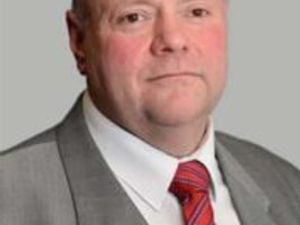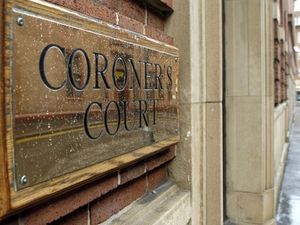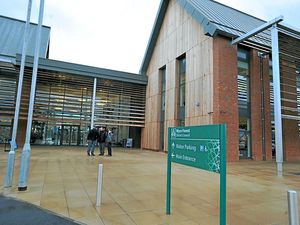Betty Boothroyd – a friend of the Queen and the ordinary person
Retired Express & Star reporter Ken Tudor became a close friend of the late West Bromwich MP Betty Boothroyd - this is his personal tribute.
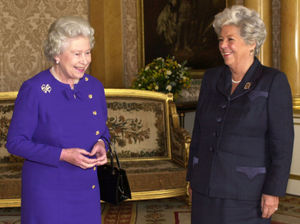
That wonderful warm smile of Betty Boothroyd was evident wherever she was – talking to constituents, chatting to schoolchildren or welcoming people to Speaker’s House.

But most of all it was a smile that was fit for a Queen – and it needed to be because the girl brought up in a cobbled street in Dewsbury was to become a friend of the Sovereign.
The Queen was so impressed by Betty’s rise from being a shorthand typist to becoming one of the leading characters in British politics that she invited her into the Order of Merit.
The OM is an amazing selection of specialists who have given distinguished service in so many walks of life specially selected to be a friend, confidant and advisor to the Crown. The list of OM members is restricted to 24 living members.
My first meeting with Betty was on the night she was selected to be Labour candidate for West Bromwich West in 1972 and she was to be a superb professional contact and a friend for 50 years.
When she emerged as victor I pounced. But she brushed me aside saying she had to catch a train to London and did not have time to talk. Despite my protestations she swept out of the community centre into the night.
Frankly I was not impressed but next morning Betty was on the phone – already calling very friendly and warm, to arrange a lunch to discuss her ambitions.
After that we got on a like a house of fire, apart from a few times I had to write articles criticising her stance on a subject, and she gave me exclusive after exclusive.
During that time she was anxious that the people of West Bromwich, Tipton and Wednesbury knew that she was always fighting their corner.
When she was made a European Parliament MP and received some criticism for it she arranged for me to travel with her to Luxembourg and Strasbourg to see her at work.
She had of course made preparations and made representations for more financial aid for the Black Country in meetings she somehow managed to get me into.
Later when she was Speaker she invited me to stay at Speaker’s House to see the long hours she worked – and how she picked up the phone to people in authority to press for assistance for a Tipton factory or a new roof for a Wednesbury School.
One of Betty’s great days in Tipton was the time she persuaded the Queen to stop her train on the way to a Wolverhampton venue to see the work of Tipton City Challenge which pumped £144,000 in projects into the town.
Apparently they had chatted about the Black Country and Betty said the Queen would be going through Tipton rail station on the way to Wolverhampton.
Soon officials were instructed to stop the train to give the Queen the time to go up Owen Street to officially open the Challenge’s offices and to meet local dignitaries, business people and to be cheered by thousands of local schoolchildren.
What a “smile day” that was Betty, and for me because I was there to see these two fascinating women enjoying each other’s company and their public.
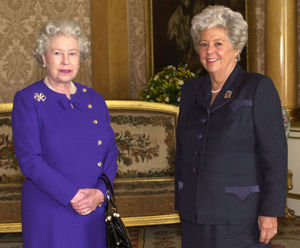
Some of her broadest smiles were saved for her many visits to Darby and Joan clubs where she was able to let her hair down and have a cup of tea, and a waltz or two with some of the elderly men.
Years later I bumped into old chaps down on allotments or in supermarkets who came up and said he loved the day he got to dance with Betty Boothroyd.
She always had a warm smile when she used to visit the Express & Star’s office at Black Lake at West Bromwich to have a chat with me and other people in the office.
Once a receptionist stopped her on the stairs and asked her where she was going. “To see Ken Tudor," she said.
The receptionist, bravely doing her duty, told her to hang on and rang me to say I had a visitor.
But when she asked the Speaker who she was and whispered to me “Oh my God – it’s Betty Boothroyd.” We all had a laugh and they were good friends afterwards.
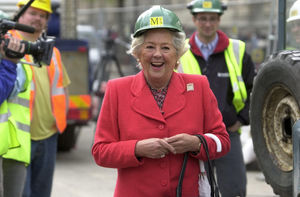
The former dancer was a big fan of the Star, admiring its all-round coverage of local politics and general news and saw it as her direct link with her constituents.
If she was doing something interesting, had helped to get grants or was meeting a group of concerned residents Betty would give me a call and the people in Sandwell knew she was working for them.
When she was first elected MP the Star’s brilliant photographer Geoff Wright took an amazing photograph of Betty and her elderly mother Mary at the Flash Harry pub in Hill Top.
On my last visit to Betty’s home that photograph of the two lovely smiling woman was hanging in her toilet alongside a Parliamentarian of the Year Award.
Apart from her relationship with the Queen she met some of the greatest figures of the 20th century. She helped in the election of President John Kennedy, worked with and against all the Prime Ministers since the 1960 and was later to meet her greatest hero Nelson Mandela.
She was so proud to welcome him to the House of Commons. When she met him Betty proudly told him she was one of the regular anti-Apartheid protesters outside the South African Embassy. The great man smiled and said: “Betty, I know!”
Later that day she rang to tell me excitedly that she had to escort Mr Mandela down a tricky flight of 50 steps. He already knew, he said, because he had been for a practice session at six o’clock. She was as high as a kite!
Later Betty was to visit South Africa to meet Mr Mandela and when they were photographed together she asked the photographer to send the picture to Ken Tudor, at Black Lake, West Bromwich.
When she became Speaker she did not get to the Black Country as often as she did and so invited me to Parliament more often and when she retired to her home near Cambridge I was a regular visitor. There we chatted and gardened together, planting up the borders and pruning the roses on her cottage home in the country.
She complained bitterly about her battles with wildlife in the garden, including squirrels, crows, pigeons – and shrub-eating deer.
The latter were such a nuisance that she asked me to get some lion dung from Dudley Zoo because she heard that would work, but it was only marginally successful.
My relationship with Betty paid dividends when she shocked the Commons in 2000 by announcing her retirement. She had called me in the morning and asked when our deadline for that day’s paper was.
That afternoon I was dragged out of an editorial meeting in Wolverhampton to speak to Betty and a shocked Ken Tudor had 10 minutes to write an exclusive story for that evening’s newspaper.
During retirement speeches in the Commons an article I wrote about Betty was quoted by Peter Snape, MP for West Bromwich East.
He read to the Commons a section of my article: “Over the years I have watched her battle for constituents reminding officers that they worked for the people and deserved respect.
“In this mood she is a formidable woman, her manicured and expertly varnished fingers fencing in front of people as she puts her point over.”
This brought a big smile on the face of the retiring Speaker.
For a plain-speaking Yorkshire woman who could be so controlling and forceful and aggressive in the Commons chamber she was amazingly gentle and warm with ordinary people.
She loved engaging with shoppers on West Bromwich High Street or Wednesbury market and to them she became “Our Betty”.
They would call out “Hi Our Betty – OK?” as she made a point of buying a few vegetables alongside them I often thought that this was where she was most at home – and where she saved her biggest smiles of all.
Betty was a champion of democracy and freedom and became known worldwide for the way she barked out “Order, Order”.
And yet she never forgot where she came from, the streets of 1930s poverty in a Yorkshire town where people like her family, who worked in a textile factory, struggled to survive.
She told me that she loved nothing more than to talk to ordinary folk, about their hopes and aspirations and was pleased if she could help them on their way.
It is sad for me that no longer will the phone ring and that lovely chirpy voice will say: “Hiya luvvie, how are things?
The great and the good have been on the TV and radio to tell their stories of what she meant to them and I have been touched with the messages I have received about her loss.
But battling Betty will always be with us though, remembered as the first Woman Speaker, great MP, friend of Royalty and most of all as a good and loyal friend.
And we will all miss that marvellously warm smile which warmed my heart for half-a-century.
What a woman, what a woman.

